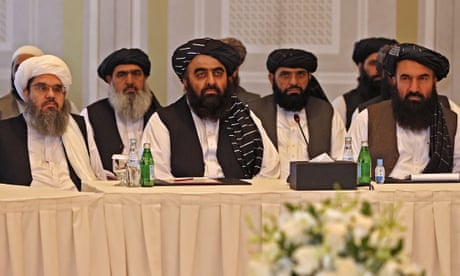Fawzia Koofi
Since it became clear that the Taliban will be the only Afghan voices at the table and women’s rights will not officially be on the agenda at the UN meeting on Afghanistan in Doha, I have received thousands of messages from women inside and outside the country expressing their deep despair, shock and disappointment.
There is increasing concern about the tone that the international community – especially the UN mission in Afghanistan, Unama – have adopted to normalise the human rights violations in Afghanistan in an effort to secure the Taliban’s participation in the Doha talks.
The agenda for next week’s meeting will focus on counter-narcotics and the private sector, two peripheral issues chosen to ensure Taliban participation by putting nothing more contentious on the table.
This means the conference will ignore the fundamental issues of holding the Taliban accountable for their unprecedented violations of the basic rights of Afghan women and girls to have education, employment and active participation in society.
On Wednesday, in response to the outpouring of criticism, UN undersecretary-general Rosemary DiCarlo said that Afghan women’s rights, among other key issues, will be raised in every meeting with the Taliban. She conveniently ignored the fact that the whole world, including Islamic scholars, have been raising the same issues with the Taliban for more than three years to no avail, while the the group continues to impose more bans and restrictions on the women of Afghanistan with impunity.
The agenda also clearly contradicts the UN’s own charter and the security council resolutions 1325 and 2721, which call on the UN secretary general to appoint a special envoy for Afghanistan and to ensure participation of all sides, especially Afghan women’s groups.
It also disregards the lack of a legal framework and an inclusive and accountable governing system that ensures participation of all sides. Without a resolution to these two key issues, Afghanistan will never cease to be the centre of narcotics production and drug trafficking, nor will the country’s private sector develop without full participation of women – the two items on the UN’s agenda. According to the UN’s own assessment, the Taliban bar on women’s employment is costing the Afghan economy more than $1bn a year.
If Unama and others in the international community see the Taliban as the only reality for Afghanistan, they need to look at our history. Millions of Afghans risked life and limb to cast their votes in the 2004, 2009 and 2014 elections, despite threats, fraud and irregularities. They believed in the democratic values and principles which the international community propagated to them for more than 20 years.
Yet Afghans today are bewildered that the same international community which championed free elections and women’s rights is willing to compromise its own moral values to cave in to an extremist ideological group. A group that represents a ruling armed clerical regime which has established gender-apartheid in Afghanistan and directed the subjugation of more than 20 million women and girls into an abyss of hopelessness.
Given the moral collapse of the international community when it comes to upholding their own values for human rights, women’s rights, and equality for all, most Afghans feel there is no chance of a fair and transparent intervention by global bodies such as the UN to seek a reasonable and durable solution to the conflict in Afghanistan.
They question the international community’s commitment to women’s rights when their own fundamental rights were so easily bartered in exchange for geopolitical convenience during the withdrawal of troops from Afghanistan.

Taliban members, who came to power with guns, can hold on to power through violence but will never subdue the will of a nation which has never been colonised. Our people, men and women, need education, employment and the prospect of liberty for achieving their dreams in order to realise their full potential. And if the Taliban hope that by sticking to their gender-apartheid vision and forcing the morally compromised internationally community to grant them some level of recognition, will help them achieve their aims they are also wrong.
It is the Taliban who launched their war on the women of our country. Women are half of our population, and the country cannot move forward without full participation of Afghan women, incorporation of the magnificent diversity of our country, and the incredible talent and potential of our youth who are now fleeing Afghanistan because they do not see any future under Taliban rule.
The Taliban have silenced women’s voices inside the country using violence and torture. And by excluding women’s participation at the Doha meeting, the UN and others in the international community have enabled the Taliban to try to silence our voices outside Afghanistan, too.
If the international community and the UN want to be useful, let the women of Afghanistan directly talk to the Taliban. This is something that the leaders of the gender-apartheid regime fear the most.
-
Fawzia Koofi is a politician and women’s rights activist who was the first woman vice-president of the Afghan parliament and chair of its women’s affairs and human rights commission.
 Afghanistan Peace Campaign
Afghanistan Peace Campaign